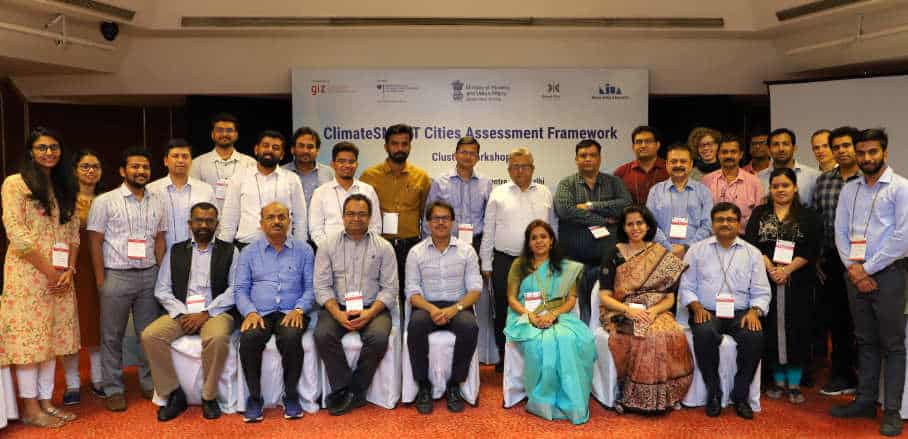ClimateSmart Cities Assessment Framework: India’s Innovative Strategy for Climate Resilient Cities
India’s ClimateSmart Cities Assessment Framework empowers cities to tackle climate change. It’s a progressive initiative with tangible actions that aim to improve the lives of citizens while building resilience to climate-related shocks.
India has recently surpassed China as the world’s most populated country, and it is projected that by 2030, India will be home to seven megacities with a population exceeding 10 million people. While cities are often seen as engines of growth and centres for economic, social and cultural development, they are also the biggest energy consumers and are particularly vulnerable to the impacts of climate change due to their high population density.
In fact, according to the Global Climate Risk Index 2021, India ranks 7th among the most affected countries in the world. This is a significant concern, given that the country is projected to add 416 million urban dwellers by 2050, as the rural population migrates to urban areas in search of economic opportunities and better living conditions.
Further, India aims to achieve a USD 5 trillion economy by 2025. However, population and the size of the economy are two major drivers of absolute greenhouse gas (GHG) emissions, which in turn exacerbate the impacts of climate change.
Cities can make a significant contribution to mitigating climate change and become more resilient to climate-related shocks. To achieve this, cities must be well-informed and equipped with relevant and appropriate measures based on an objective and contextual framework. To this end, the Ministry of Housing and Urban Affairs (Government of India) launched the “ClimateSmart Cities Assessment Framework” (CSCAF) in cooperation with the Federal Government of Germany in February 2019.
Climate Change Mitigation Made Easy with CSCAF
This innovative framework empowers cities to assess their present situation and provides a roadmap for them to adopt and implement relevant climate actions. Not only that, but it also disseminates best practices adopted by Indian and international cities, setting contextual standards in green, sustainable, and resilient urban development. By using CSCAF, cities can effectively mitigate the adverse effects of climate change. And pave the way for a sustainable future.
The objective of the ClimateSmart Cities Assessment Framework is aimed to equip Indian cities with a comprehensive roadmap to effectively combat climate change. With a focus on five key sectors – Energy and Green Buildings, Urban Planning, Green Cover and Biodiversity, Mobility and Air Quality, Water Management, and Waste Management – the framework consists of progressive and measurable indicators that support both, mitigation and adaptation measures.
The best part? The indicators are designed in a progressive nature, allowing cities to assess where they stand and encourage them to adopt appropriate actions to improve their score in the future. By encouraging cities to strive for improvement, the framework also helps them build climate resilience.
100 cities, 100 million people: India’s bold move to fight climate change
Since its inception in 2019, annual assessments are conducted. The first assessment saw 100 Indian cities under the ambitious Smart Cities Mission participate, impacting more than 100 million people. The aim was to promote low-carbon development, deploy energy-efficient technologies and invest in climate-resilient infrastructure at the local level.

Brainstorming Sessions for CSCAF Development with Cities © GIZ
With each year, the framework witnessed a steady increase in the number of cities covered. India is targeting to extend its ambit to the 500 biggest cities by 2025. Being first-of-its-kind and aspirational, the CSCAF is an initial but bold step towards making Indian cities equipped to tackle the menace of climate change and safeguard India’s investments in the urban sector which amounts to € 8.5 billion in the current year.
But it´s not only about the numbers. At its core, the CSCAF is a community-focused initiative that seeks to improve the lives of citizens. As part of India’s urban ministry’s focus on improving the ‘Quality of Life’ of its citizens, the framework emphasises tangible steps that can be taken towards combating climate impacts.
From Assessment to Action: NIUA Launches Climate Centre for Cities
To provide sustained impetus and long-term perspective to ongoing efforts, the National Institute of Urban Affairs (NIUA) has set up a dedicated “Climate Centre for Cities”. This centre is responsible for regular monitoring of the performance of cities concerning their climate action.
Similar to the Skills Centre for Municipal Climate Change Mitigation (Service- und Kompetenzzentrum: Kommunaler Klimaschutz (SK: KK) at the German Institute of Urban Affairs (Difu), the Climate Centre for Cities facilitates a series of exchanges among Indian and German institutions. These exchanges enable the centre to provide handholding to cities in the form of training and capacity-building activities, knowledge management, creating alliances, partnerships and development of tools and technology to support cities in their climate endeavours.

Exchange programme among National Institute of Urban Affairs and the Deutsches Institut für Urbanistik © GIZ
In conclusion, ClimateSmart Cities Assessment Framework is a timely and innovative initiative that has been widely embraced by Indian cities. By emphasising good governance and innovation in its approach to assessments, the framework has spurred a nationwide evaluation of prominent cities on climate parameters. This has not only fostered increased political ownership but has also brought important questions on climate change, disaster preparedness, mitigation and adaptation action at the local level to the forefront of discussions among Indian parliamentarians.
The swift and comprehensive development and implementation of the framework vary from previous business-as-usual approaches, highlighting the urgent need to incorporate urban aspects into subnational climate action plans. The actual contribution and worth of this framework will ultimately depend on how successfully this leads to the achievement of Indian global climate commitment.
Overall, the ClimateSmart Cities Assessment Framework serves as a powerful reminder of the critical role that cities can play in mitigating climate change and building resilience. By empowering towns with the tools and knowledge needed to take bold and decisive climate action, this framework is paving the way for a more sustainable and resilient future for India and the world.
